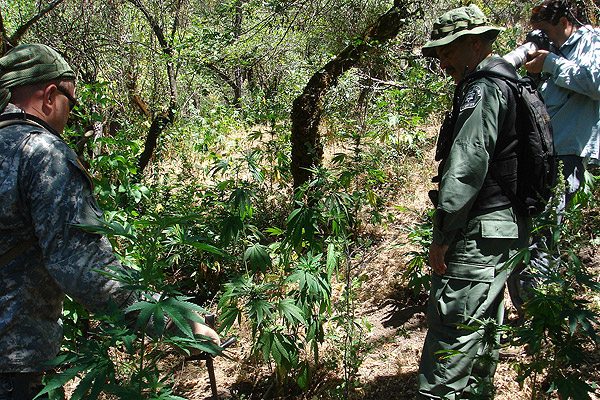
One of the specters wrought by the marijuana decriminalization ordinance—which looks, with the support of Garry McCarthy and even James Balcer, like it will pass easily—is the slippery slope to legalization. This is a bad thing, according to the Tribune editorial board:
What are we telling our kids by making possession a ticketing offense? That pot is harmless? That prosecuting people over a joint or two (or 20) is excessive? That sounds like an argument for legalization, not for lower penalties, but we're not ready to go there and we don't think Chicagoans are, either.
But some folks are ready, like Ben Joravsky: "the ordinance doesn't go far enough—legalize the stuff already!"
It's not much to be excited or worried about—it's essentially a moot point, at least as far as total legalization goes. California tried this a couple years ago with Proposition 19. It didn't pass, but even if it had it's unthinkable that it would have lasted. Mark A.R. Kleiman explains why. Mostly, the feds wouldn't allow the conflict between state and federal law for practical reasons:
According to a study issued by the RAND Corp.'s Drug Policy Research Center this month, if the initiative passes, the pretax retail price of high-grade sinsemilla marijuana sold legally in California is likely to drop to under $40 per ounce, compared with current illicit-market (or dispensary) prices of $300 an ounce and more. Yes, the counties would have authority to tax the product, but even at a tax rate of $50 an ounce — more than 100% of the pretax price — the legal California product would still be a screaming bargain by national standards, at less than one-third of current black-market prices.
As a result, pot dealers nationwide — and from Canada, for that matter — would flock to California to stock up. There's no way on earth the federal government is going to tolerate that. Instead, we'd see massive federal busts of California growers and retail dealers, no matter how legal their activity was under state law.
(According to the crowdsourced site PriceOfWeed.com, the illicit-market price in Chicago is about in that range.)
Even in the Netherlands, famous for their extremely tolerant drug laws, is tightening sales down to locals only, partially for congestion reasons:
The impetus for changing the policy originated with, of all things, a parking shortage. In the southern city of Maastricht, sandwiched between the German and Belgian borders, hundreds of drug tourists drive in daily from elsewhere in Europe to purchase marijuana, creating an infuriating traffic nuisance.
As Kleiman points out, marijuana isn't fully legalized in the Netherlands, either, because it would be a substantial violation of international treaties. It's a matter of what you can get away with: international law is somewhat flexible, so countries can get away with a bit; below that national law is somewhat flexible. It's a long, loose chain, but tug on one end hard enough, and it will make it up the line. The most Chicago could do, it seems, is make it as not-illegal as possible. Other local and state goverments have made marijuana less illegal than the ordinance would.
Kleiman supports a regime that would allow for marijuana production—but only small-time marijuana production, threading the needle between an illicit market and a mass market. The former's problems are obvious; the latter's are obvious if you consider the tobacco and alcohol markets.
Legalization may be aways off, especially since it would require movement on the national and even international levels. If or when it does reach that point, what it will actually look like will be an interesting, and important, public policy question. I sometimes think, when reading about places like Owsley County (seriously, go read this) and the many impoverished Appalachian communities I grew up near, that it would be a boon for the economy, since that region is already a nontrivial producer—it's already a multibillion-dollar market. But a friend of mine lives in another rural marijuana-saturated area, probably the nation's most notorious, and wrote a long and fascinating piece about the reception of Proposition 19. What the people feared there was the loss of a way of life to King Bong:
A marijuana lobby will set up on K Street, and catchy TV spots for “Marlboro Greens” (a figment of urban legend among marijuana growers for decades) will air between ads for Miller High Life and Doritos during the Super Bowl. And we won’t have much choice in the matter.
Mere legalization isn't a panacea for governments. The last time Appalachia hit on a natural product that's meant to be burned and is bad for your lungs, it didn't leave a legacy of thriving, upstanding governance and the social and economic indicators that follow.
His suggestion: that a legalized industry should follow the lines and loopholes of Humboldt's neighbors in Mendocino wine country. It's a reminder that the problem isn't just illicit drugs—it's also the illicit market, and any policy has to consider what might happen when the former is made licit, and thus removed from the latter.
Photograph: USFS Region 5 (CC by 2.0)


